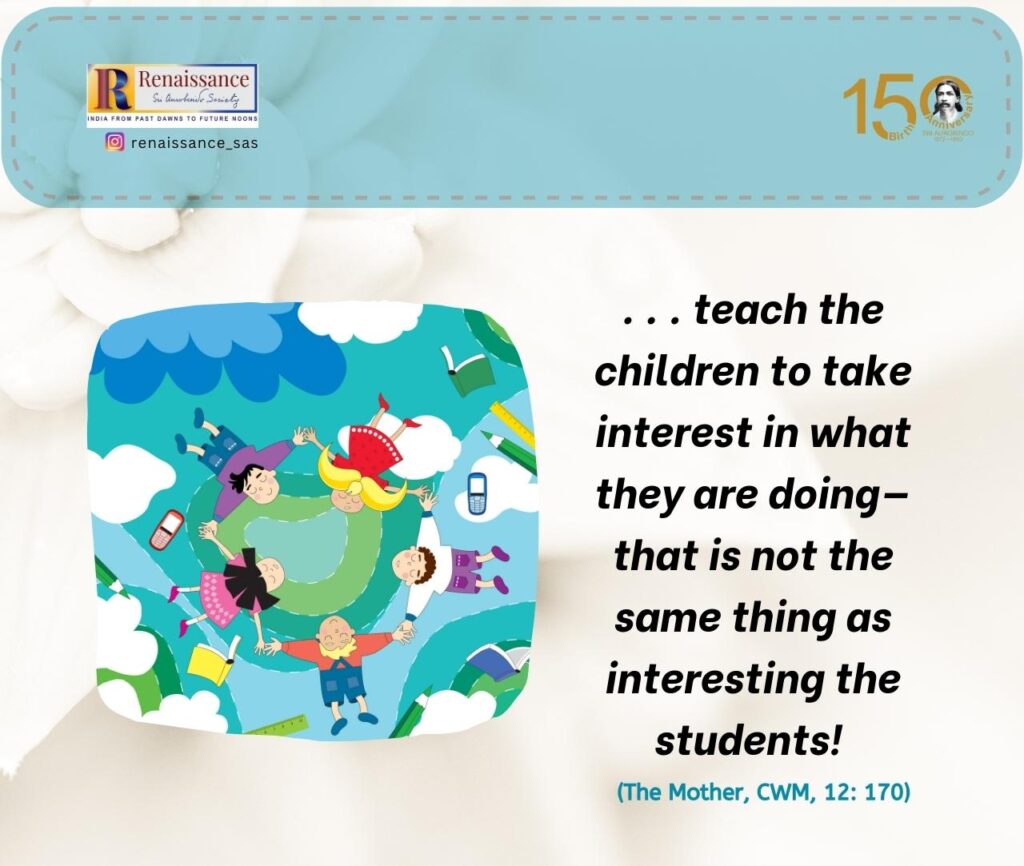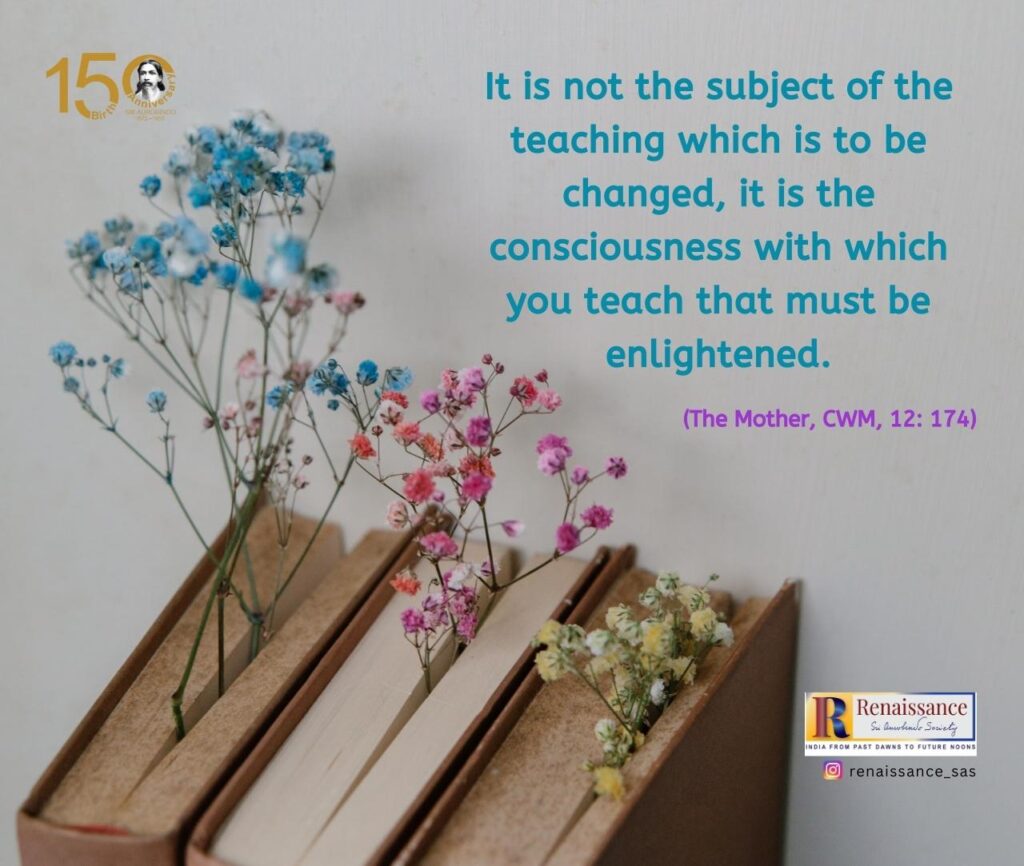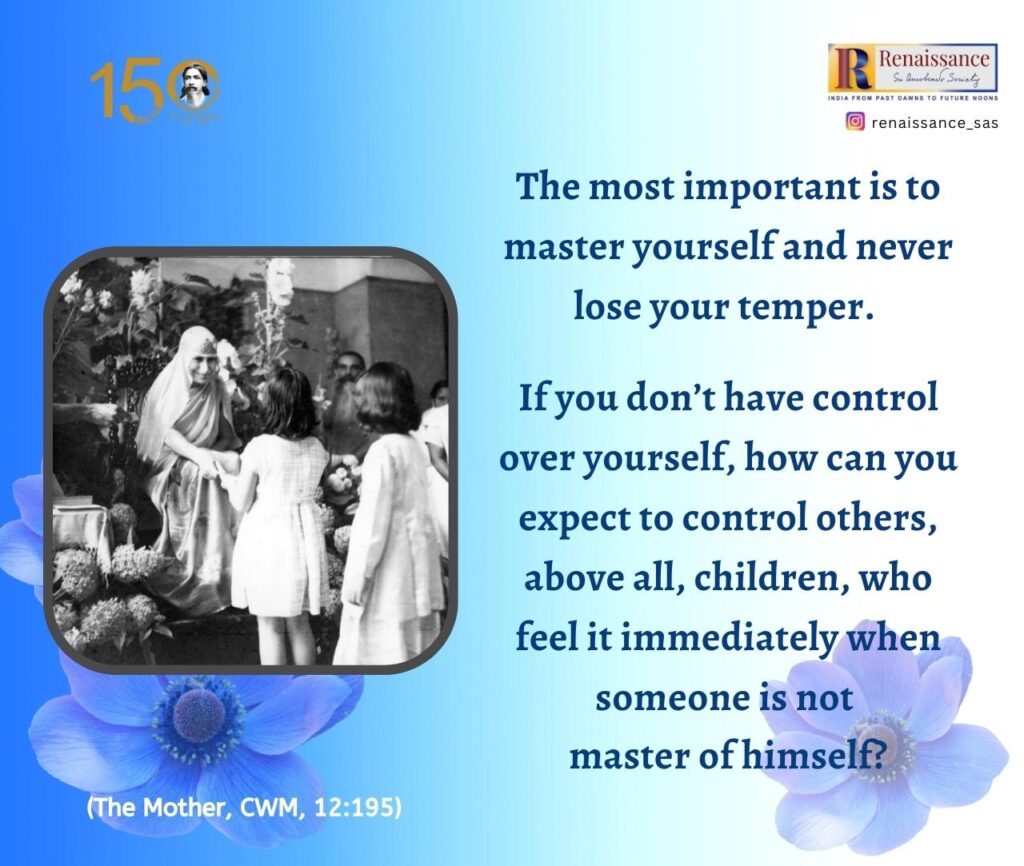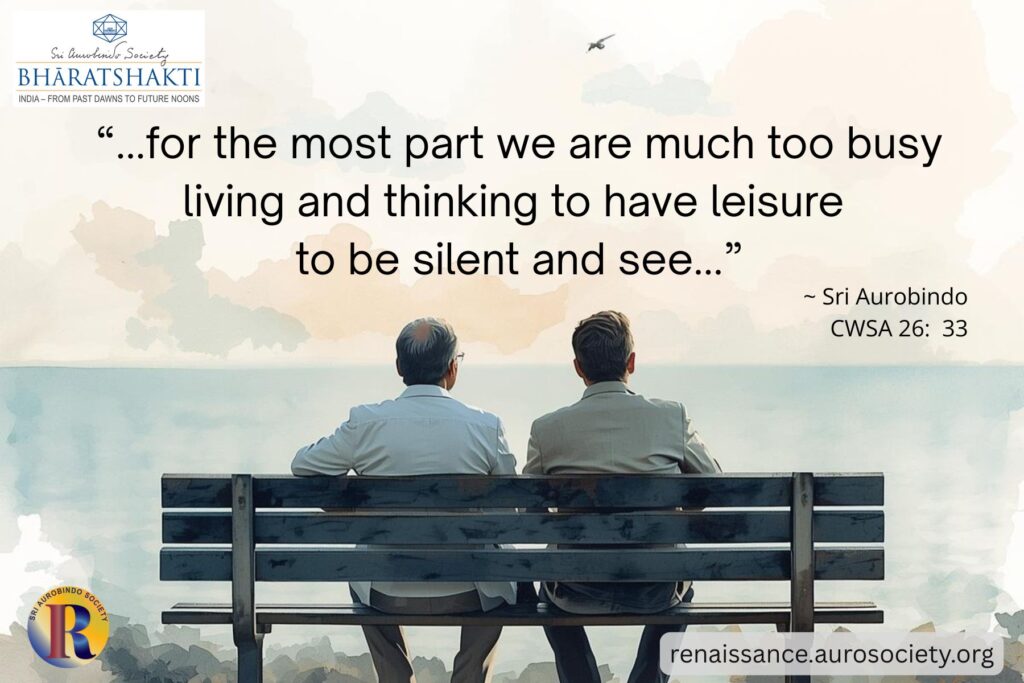Volume III, Issue 10
Author: The Mother
Editor’s note: We have selected a few passages from the Mother’s correspondence with the teachers at Ashram school (SAICE) which are relevant for all educational contexts. These focus on issues concerning pedagogical approach, maintaining discipline in the classroom, and a few other things. We have made a few formatting revisions for this online presentation.

The school should be an opportunity for progress for the teacher as well as for the student. Each one should have the freedom to develop freely.
A method is never so well applied as when one has discovered it oneself. Otherwise it is as boring for the teacher as for the student.
~The Mother, CWM, Vol. 12, p. 168
***
There is one thing that I must emphasise. Don’t try to follow what is done in the universities outside. Don’t try to pump into the students mere data and information. Don’t give them so much work that they may not get time for anything else.
You are not in a great hurry to catch a train. Let the students understand what they learn. Let them assimilate it. Finishing the course should not be your goal.
You should make the programme in such a way that the students may get time to attend the subjects they want to learn. They should have sufficient time for their physical exercises. I don’t want them to be very good students, yet pale, thin, anaemic.
Perhaps you will say that in this way they will not have sufficient time for their studies, but that can be made up by expanding the course over a longer period. Instead of finishing a course in four years, you can take six years. Rather it would be better for them; they will be able to assimilate more of the atmosphere here and their progress will not be just in one direction at the cost of everything else. It will be an all-round progress in all directions.
~ The Mother, CWM, Vol. 12, p. 169
***
Also read:
Spirituality in Education: A Few Fundamentals

What you should do is to teach the children to take interest in what they are doing—that is not the same thing as interesting the students! You must arouse in them the desire for knowledge, for progress.
One can take an interest in anything—in sweeping a room, for example—if one does it with concentration, in order to gain an experience, to make a progress, to become more conscious.
I often say this to the students who complain of having a bad teacher. Even if they don’t like the teacher, even if he tells them useless things or if he is not up to the mark, they can always derive some benefit from their period of class, learn something of great interest and progress in consciousness.
Most teachers want to have good students: students who are studious and attentive, who understand and know many things, who can answer—well good students. This spoils everything.
The students begin to consult books, to study, to learn. Then they rely only on books, on what others say or write, and they lose contact with the superconscient part which receives knowledge by intuition. This contact often exists in a small child but it is lost in the course of his education.
For the students to be able to progress in the right direction, it is obvious that the teachers should have understood this and changed their old way of seeing and teaching. Without that, my work is at a standstill.
~ The Mother, CWM, Vol. 12, p. 170
***
For students of high capacity, one teacher well versed in his subject is enough—even a good text-book, together with encyclopedias and dictionaries would be enough.
But as one goes down the scale and the capacity of the student becomes lower, the teacher must have higher and higher capacities: discipline, self-control, consecration, psychological understanding, infectious enthusiasm, to awaken in the student the part which is asleep the will to know, the need for progress, self-control. [. . .]
I ask each teacher to consider his work in the school as the best and quickest way of doing his Yoga. Moreover, every difficulty and every difficult student should be an opportunity for him to find a divine solution to the problem.
~ The Mother, CWM, Vol. 12, pp. 171-172

It is not the things or the activities that are high or low, it is the consciousness of the doer which is true or false.
If you unite your consciousness with the Supreme Consciousness and manifest it, all you think, feel or do becomes luminous and true. It is not the subject of the teaching which is to be changed, it is the consciousness with which you teach that must be enlightened.
~ The Mother, CWM, Vol. 12, p. 174
The teachers have to grow into the needed consciousness, emphasis should be on the actual experiences of work and there should be no difference in the child’s mind between work and play—all should be a joy of interest. It is the teacher’s job to create that interest.
If the interest is there, the right work will follow.
~ The Mother, CWM, Vol. 12, p. 184
Discipline in the Class
Constraint is not the best or most effective principle of education. The true education should open out and reveal what is already there in these developing beings. Just as flowers open out in the sun, children open out in joy.
Obviously joy does not mean weakness, disorder and confusion,—but a luminous kindliness that encourages what is good and does not severely emphasise what is bad. Grace is always closer to the truth than justice.
~ The Mother, CWM, Vol. 12, . 192
***
Example is the most powerful instructor.
Never demand from a child an effort of discipline that you do not make yourself. Calm, equanimity, order, method, absence of useless words, ought to be constantly practised by the teacher if he wants to instil them into his pupils.
The teacher should always be punctual and come to the class a few minutes before it begins, always properly dressed.
And above all, so that his students should never lie, he must never lie himself; so that his students should never lose their tempers, he should never lose his temper with them; and to have the right to say to them, “Rough play often ends in tears”, he should never raise his hand against any of them.
These are elementary and preliminary things which ought to be practised in all schools without exception.
~ The Mother, CWM, Vol. 12, p. 193
***

To the teachers of all the infant classes
One rule which must be rigorously applied:
It is absolutely forbidden to hit the children—all blows are forbidden, even the slightest little slap or the so-called friendly punch. To give a blow to a child because he does not obey or does not understand or because he is disturbing the others indicates a lack of self-control, and it is harmful for both teacher and student.
Disciplinary measures may be taken if necessary, but in complete calm and not because of a personal reaction.
***
Q: What can I do to achieve a silent atmosphere in the classroom?
Be completely silent yourself.
Bring a piece of cardboard with you, about one metre long, on which you write in very big letters, black on white, SILENCE (much bigger than that) and as soon as the students start talking, put the cardboard in front of you.
~ The Mother, CWM, Vol. 12, pp. 195-196
***
All the teachers who give lessons to a certain group of students should agree among themselves to allot the work so that the students are not overworked and can enjoy a rest and a relaxation that are indispensable. [. . .]
I am not for treating all the children in the same way; it makes a kind of uniform level, advantageous for those that are backward but detrimental for those who can rise above the common height.
Those who want to work and learn must be encouraged. But the energy of those who dislike studies must be turned to another outlet.
~ The Mother, CWM, Vol. 12, pp. 197-199

Be an Example
Q.: Sweet Mother, during our tournaments there are many who play in a very bad spirit. They try to hurt others in order to win. And we have noticed that even the little ones are learning to do this. How could it be avoided?
With children it is above all ignorance and bad example which cause the harm. So it would be good if, before they begin their games, all the group-leaders, the captains, call together all those they are in charge of and tell them, explain to them exactly what Sri Aurobindo says here, with detailed explanations. . . These things must be repeated often to the children. And then, you must warn them against bad company, bad friends. . .
And above all, set them the right example…. Be yourself what you would like them to be.
Give them the example of disinterestedness, patience, self-control, constant good humour, the overcoming of one’s little personal dislikes, a sort of constant goodwill, an understanding of others’ difficulties; and that equality of temper which makes children free from fear, for what makes children deceitful and untruthful, and even cunning, is the fear of being punished.
If they feel secure, they will hide nothing and you will then be able to help them to be loyal and honest. Of all things the most important is good example.
Sri Aurobindo speaks of that, of the invariable good humour one must have in all circumstances, this self-forgetfulness: not to throw one’s own little troubles on other; when one is tired or uncomfortable, not to become unpleasant, impatient.
This asks for quite some perfection, a self-control which is a great step on the path of realization. If one fulfilled the conditions needed to be a true leader, even if only a leader of a small group of children, well, one would already be far advanced in the discipline needed for the accomplishment of the yoga.
~ The Mother, CWM, Vol. 9, p. 81

~ Design: Beloo Mehra



